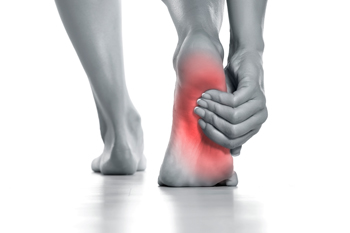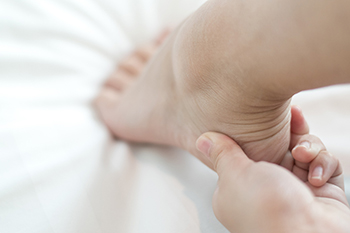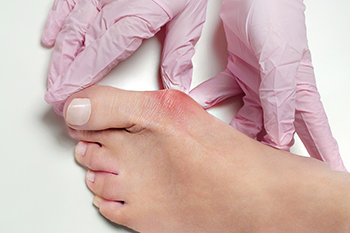Connect With Us
Blog
Items filtered by date: May 2025
When the Ball of Your Foot Starts to Hurt

Pain in the ball of the foot, known medically as metatarsalgia, can make standing, walking, or even wearing shoes uncomfortable. This area takes on a lot of pressure during everyday movement, especially in activities that involve running or jumping. Common causes include wearing poorly fitting shoes, high heels, overuse, foot shape, or conditions like bunions or hammertoes. The pain may feel sharp, burning, or like you are stepping on a small pebble. Resting, using cushioned insoles, and wearing supportive shoes can help ease discomfort. If left unaddressed, this pain may worsen and affect how you move. In some cases, custom orthotics or changes in activity may be recommended to relieve pressure. If you are feeling ongoing pain in the ball of your foot that is not improving with home care, it is suggested that you consult a podiatrist for a full evaluation and appropriate treatment.
Foot Pain
Foot pain can be extremely painful and debilitating. If you have a foot pain, consult with Dr. James D. McAlexander from Gig Harbor Foot and Ankle Clinic. Our doctor will assess your condition and provide you with quality foot and ankle treatment.
Causes
Foot pain is a very broad condition that could be caused by one or more ailments. The most common include:
- Bunions
- Hammertoes
- Plantar Fasciitis
- Bone Spurs
- Corns
- Tarsal Tunnel Syndrome
- Ingrown Toenails
- Arthritis (such as Gout, Rheumatoid, and Osteoarthritis)
- Flat Feet
- Injury (from stress fractures, broken toe, foot, ankle, Achilles tendon ruptures, and sprains)
- And more
Diagnosis
To figure out the cause of foot pain, podiatrists utilize several different methods. This can range from simple visual inspections and sensation tests to X-rays and MRI scans. Prior medical history, family medical history, and any recent physical traumatic events will all be taken into consideration for a proper diagnosis.
Treatment
Treatment depends upon the cause of the foot pain. Whether it is resting, staying off the foot, or having surgery; podiatrists have a number of treatment options available for foot pain.
If you have any questions, please feel free to contact our office located in Gig Harbor, WA . We offer the newest diagnostic and treatment technologies for all your foot care needs.
What Is a Curled Toenail?

Curled toenails, also known as involuted or pincer nails, occur when the sides of the nail begin to curve inward, sometimes digging into the surrounding skin. This condition can be caused by genetics, wearing improper footwear that puts pressure on the toes, or fungal infections that can gradually distort nail shape. Other causes may include trauma or long-term neglect of proper nail care. Symptoms can range from mild discomfort to sharp pain, especially when walking or wearing tight shoes. The skin around the nail may become red, tender, or swollen, and, in some cases, an infection may develop. A podiatrist can assess the severity and underlying cause of the curled toenail. Treatment options include trimming and reshaping the nail, treating fungal infections, recommending proper footwear, or using special devices to gradually correct the nail’s shape. In more severe cases, partial nail removal or minor procedures may be necessary. If you are experiencing this condition, it is suggested that you schedule an appointment with a podiatrist for appropriate treatment.
Ingrown toenails may initially present themselves as a minor discomfort, but they may progress into an infection in the skin without proper treatment. For more information about ingrown toenails, contact Dr. James D. McAlexander of Gig Harbor Foot and Ankle Clinic. Our doctor can provide the care you need to keep you pain-free and on your feet.
Ingrown Toenails
Ingrown toenails are caused when the corner or side of a toenail grows into the soft flesh surrounding it. They often result in redness, swelling, pain, and in some cases, infection. This condition typically affects the big toe and may recur if it is not treated properly.
Causes
- Improper toenail trimming
- Genetics
- Improper shoe fitting
- Injury from pedicures or nail picking
- Abnormal gait
- Poor hygiene
You are more likely to develop an ingrown toenail if you are obese, have diabetes, arthritis, or have any fungal infection in your nails. Additionally, people who have foot or toe deformities are at a higher risk of developing an ingrown toenail.
Symptoms
Some symptoms of ingrown toenails are redness, swelling, and pain. In rare cases, there may be a yellowish drainage coming from the nail.
Treatment
Ignoring an ingrown toenail can have serious complications. Infections of the nail border can progress to a deeper soft-tissue infection, which can then turn into a bone infection. You should always speak with your podiatrist if you suspect you have an ingrown toenail, especially if you have diabetes or poor circulation.
If you have any questions, please feel free to contact our office located in Gig Harbor, WA . We offer the newest diagnostic and treatment technologies for all your foot care needs.
Understanding Sever's Disease in Growing Feet

Sever's disease is a common cause of heel pain in children and young teens, especially those who participate in sports. It is not actually a disease but a growth-related condition that affects the heel’s growth plate. As the foot grows, the Achilles tendon can pull on the developing heel bone, causing pain and swelling. Running and jumping often make it worse, and the heel may feel sore to the touch. The pain usually comes and goes, and may be more noticeable after activity. Rest and stretching can help ease symptoms. Wearing supportive shoes or heel cushions may also reduce strain. Most children outgrow the condition once their bones finish growing. If your child complains of heel pain during or after sports, it is suggested you see a podiatrist for a proper diagnosis and appropriate treatment.
Sever's disease often occurs in children and teens. If your child is experiencing foot or ankle pain, see Dr. James D. McAlexander from Gig Harbor Foot and Ankle Clinic. Our doctor can treat your child’s foot and ankle needs.
Sever’s Disease
Sever’s disease is also known as calcaneal apophysitis, which is a medical condition that causes heel pain I none or both feet. The disease is known to affect children between the ages of 8 and 14.
Sever’s disease occurs when part of the child’s heel known as the growth plate (calcaneal epiphysis) is attached to the Achilles tendon. This area can suffer injury when the muscles and tendons of the growing foot do not keep pace with bone growth. Therefore, the constant pain which one experiences at the back of the heel will make the child unable to put any weight on the heel. The child is then forced to walk on their toes.
Symptoms
Acute pain – Pain associated with Sever’s disease is usually felt in the heel when the child engages in physical activity such as walking, jumping and or running.
Highly active – Children who are very active are among the most susceptible in experiencing Sever’s disease, because of the stress and tension placed on their feet.
If you have any questions, please feel free to contact our office located in Gig Harbor, WA . We offer the newest diagnostic and treatment technologies for all your foot care needs.
Risk Factors for Bunions

A bunion is a bony bump that forms at the base of the big toe as the top of the toe leans inward toward the others. This deformity develops over time due to pressure on the big toe joint, leading to changes in the bone structure. Common causes of bunions include wearing tight or narrow shoes, genetic predisposition, and conditions like arthritis that affect the joints. Risk factors include having a family history of bunions, flat feet, and occupations that involve long periods of standing or walking. Symptoms of a bunion often include swelling, redness, tenderness, and pain surrounding the big toe joint. Over time, the discomfort can worsen, making it difficult to wear shoes comfortably and affecting overall foot function. If you have a bunion, it is suggested that you are under the care of a podiatrist who can offer treatment options to manage this condition.
If you are suffering from bunions, contact Dr. James D. McAlexander of Gig Harbor Foot and Ankle Clinic. Our doctor can provide the care you need to keep you pain-free and on your feet.
What Is a Bunion?
A bunion is formed of swollen tissue or an enlargement of boney growth, usually located at the base joint of the toe that connects to the foot. The swelling occurs due to the bones in the big toe shifting inward, which impacts the other toes of the foot. This causes the area around the base of the big toe to become inflamed and painful.
Why Do Bunions Form?
Genetics – Susceptibility to bunions are often hereditary
Stress on the feet – Poorly fitted and uncomfortable footwear that places stress on feet, such as heels, can worsen existing bunions
How Are Bunions Diagnosed?
Podiatrists often perform two tests – blood tests and x-rays – when trying to diagnose bunions, especially in the early stages of development. Blood tests help determine if the foot pain is being caused by something else, such as arthritis, while x-rays provide a clear picture of your bone structure to your provider.
How Are Bunions Treated?
- Refrain from wearing heels or similar shoes that cause discomfort
- Select wider shoes that can provide more comfort and reduce pain
- Anti-inflammatory and pain management drugs
- Orthotics or foot inserts
- Surgery
If you have any questions, please feel free to contact our office located in Gig Harbor, WA . We offer the newest diagnostic and treatment technologies for all your foot care needs.
Blog Archives
- February 2026
- January 2026
- December 2025
- June 2025
- May 2025
- April 2025
- March 2025
- February 2025
- January 2025
- December 2024
- November 2024
- October 2024
- September 2024
- April 2023
- March 2023
- February 2023
- January 2023
- December 2022
- November 2022
- October 2022
- September 2022
- August 2022
- July 2022
- June 2022
- May 2022
- April 2022
- March 2022
- February 2022
- January 2022
- December 2021
- November 2021
- October 2021
- September 2021
- August 2021
- July 2021
- June 2021
- May 2021
- April 2021
- March 2021
- February 2021
- January 2021
- December 2020
- November 2020
- October 2020
- September 2020
- August 2020
- July 2020
- June 2020
- May 2020
- April 2020
- March 2020
- February 2020
- January 2020
- December 2019
- November 2019
- October 2019
- September 2019
- August 2019
- July 2019
- June 2019
- May 2019
- April 2019
- March 2019
- February 2019
- January 2019
- December 2018
- November 2018
- October 2018
- September 2018
- August 2018
- July 2018
- June 2018
- May 2018
- April 2018
- March 2018
- February 2018
- January 2018
- December 2017
- November 2017
- October 2017

